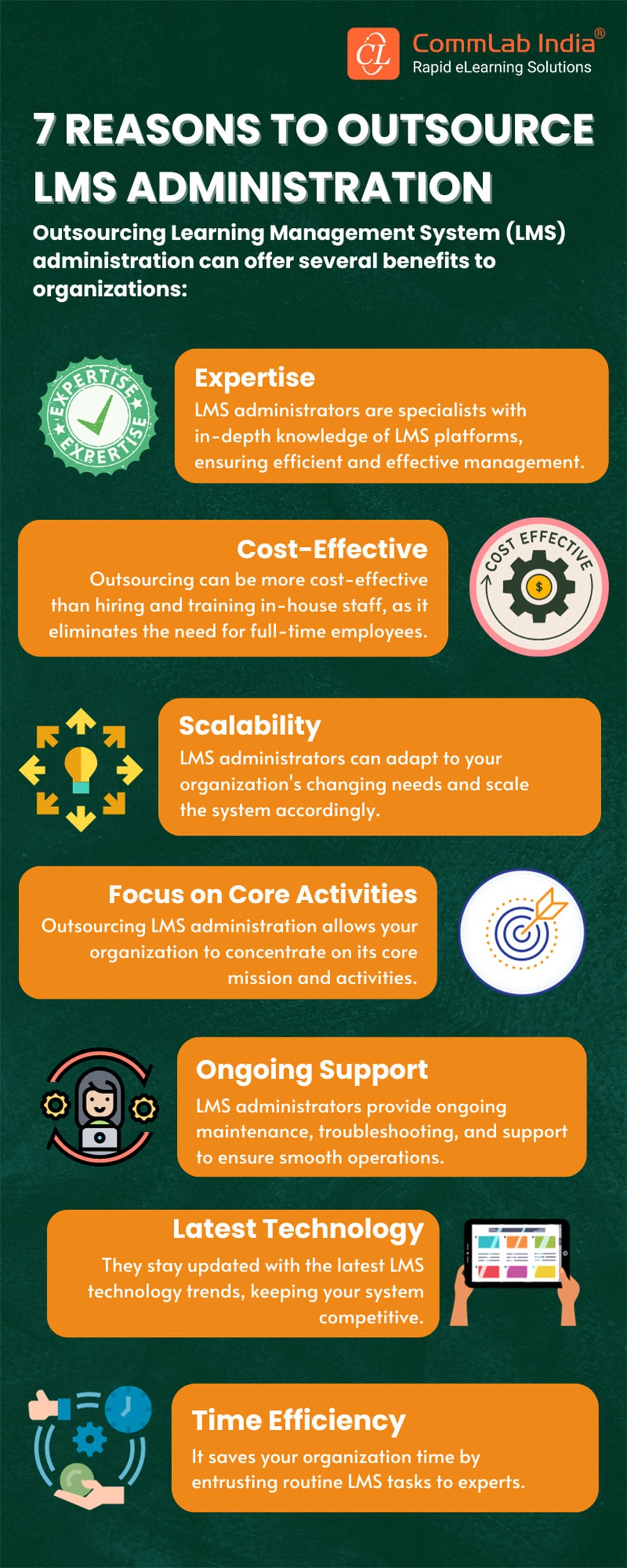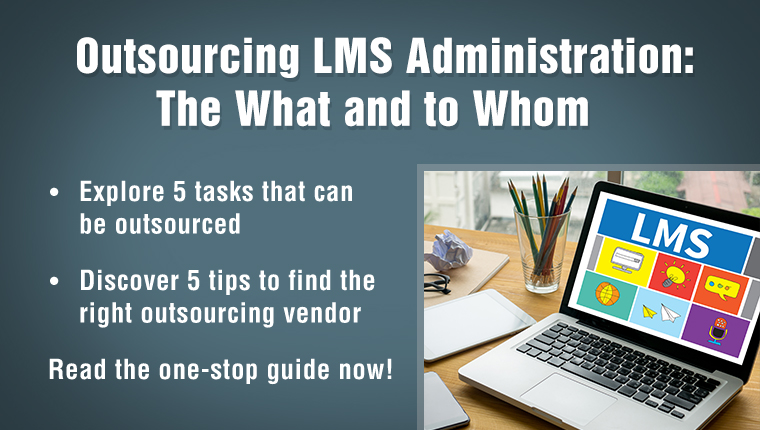5-Point Checklist to Select an Outsourcing Vendor for LMS Administration [Infographic]
![5-Point Checklist to Select an Outsourcing Vendor for LMS Administration [Infographic] 5-Point Checklist to Select an Outsourcing Vendor for LMS Administration [Infographic]](https://blog.commlabindia.com/hubfs/blogs/learning-management-system-administration-outsourcing-infographic.jpg)
Let’s assume you’ve found the perfect Learning Management System (LMS) based on your training requirements and your budget, what comes next? It will require a team to manage, but what if you don't have one already or aren't ready to create one in-house? Here's where outsourcing helps. To assist you in understanding why you should opt for outsourcing LMS administration, here’s an infographic. Have a look!
Moreover, LMS administration is a demanding job that involves a multitude of repetitive tasks. The administrator shoulders responsibilities such as handling access rights for numerous users, generating support materials, and overseeing various aspects of the learning management system. The role requires meticulous attention to detail and efficient management of training.
Common tasks involved are:
- Adding and updating courses
- Enrolling learners in courses
- Collecting data and analytics
- Creating leaderboards and rewards
- Offering personalized learning paths
- Updating and clearing up database
- Resolving learner issues
Managing all these tasks can be quite challenging, but you can ease the burden by entrusting LMS administration to a reliable vendor.
5-Point Checklist for Selecting the Right Vendor for Outsourcing LMS Administration
1. Choose a Vendor whose Core Service is LMS Administration
Specialized vendors tend to have an in-depth understanding of the intricacies associated with LMS. Their specialized knowledge enables them to offer proactive management, effective troubleshooting, and customized solutions. Organizations that partner with a provider that specializes in LMS administration stand to have a tactical approach to solving learning platform-specific issues. This specialization often translates into a smoother implementation process, ongoing support, and a better-aligned partnership that prioritizes the unique needs of the organization's learning ecosystem.
→ Download Now: LMS Migration for a Training Organization [Case Study]
2. Select a Vendor who has an Experienced Team
A team with expertise may offer a multitude of insights, having successfully handled a range of obstacles and changing learning trends. This expertise is crucial for guaranteeing the LMS is set up, maintained, and optimized effectively. Organizations can gain from strategic insights, efficient procedures, and skilled problem-solving when experienced experts are in charge. A proficient team contributes to the smooth integration of the learning platform into the company's training framework by improving the LMS's general functioning and offering a dependable support system.
3. Look for a Vendor who Addresses Security Concerns.
Select a vendor that pays attention to security, protecting sensitive information and maintaining the integrity of the LMS. Strong security precautions including encryption mechanisms, safe data storage, and adherence to accepted security standards in the business are required for this. A security-conscious vendor with a proactive stance on security not only safeguards the organization's training assets but also instills confidence in users interacting with the learning platform.
4. Opt for a Vendor who Provides Scalability
Seek out a vendor that can adapt to the changing training requirements of the company. Scalability guarantees that the LMS can expand with the company, accommodating more users, courses, and data without sacrificing functionality. A scalable vendor foresees future needs and provides flexibility to adjust the LMS to evolving conditions. This ensures that the LMS remains a dynamic and responsive tool, capable of supporting ongoing and expanding corporate training initiatives.
5. Select a Vendor who Offers Responsive Support and Maintenance System
A vendor with a robust support framework ensures that any issues or concerns are promptly addressed, minimizing disruptions in learning e. Responsive support is crucial for troubleshooting technical issues, implementing updates, and providing assistance to users. By choosing a vendor with a commitment to responsive support and maintenance, organizations can enhance the overall efficiency and reliability of their LMS.
To Wrap up!
In a nutshell, LMS administration entails a significant investment of time, given its broad scope covering various functions. The intricacies involved in managing these aspects make it a resource-intensive task. So, here outsourcing LMS administration to a third-party expert proves valuable as it allows organizations to ensure that the LMS is expertly and efficiently handled by specialists. Want to learn more? What’s better than learning from a practical example? Here’s our case study where we shared about the successful migration of LMS for a Training Organization. Download now and gain actionable insights.






![Outsource LMS Administration and Support for Better ROI [Infographic]](https://blog.commlabindia.com/hubfs/Imported_Blog_Media/lms-administration-outsourcing-info.jpg)
